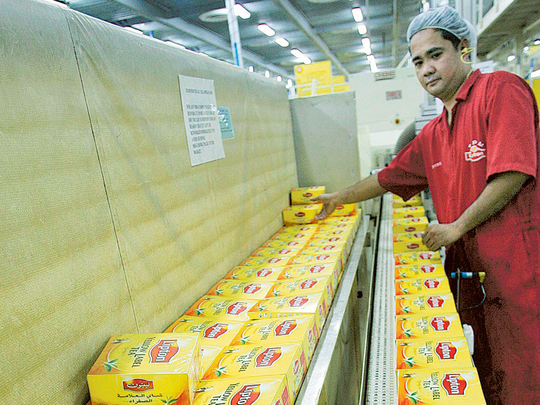
Dubai: The desert here may not grow tea commercially, but a factory by the sea in Dubai is en route to having the largest stand-alone tea facility that supplies to the rest of the world, Gulf News has learnt.
Inside Dubai’s Jebel Ali Free Zone (JAFZ), on the edge of the Arabian Gulf, hundreds of Lipton staff feverishly work to produce the equivalent of 2 million cups an hour of tea. That’s over 50 million tea cups per day — or almost 20 billion tea cups a year.
“The Lipton Jebel Ali (LJA) Factory has grown by more than 50 per cent in the last five years,” said Ahmad Kadous, Supply Chain Director of Unilever Gulf, told Gulf News. “Unilever is, by far, the largest tea company in the world, in terms of branded tea sales. However, Lipton Jebel Ali Factory is on its way to becoming the largest tea factory within Unilever. This will be achieved during 2015,” he said.
Unilever bought the Lipton brand in 1971 and Brooke Bond in 1984.
Rainforest Alliance, which conducts research on agriculture and independent environmental impact through partner universities, has named Unilever as the world’s largest tea company.
In 2009, the Jebel Ali factory produced around 22,000 tonnes, said Kadous. By end-2014, the production volume has increased by 50 per cent to 33,000 tonnes (33m kg), thus making it the biggest branded tea company in the world, said Kadous.
Next to water, tea is the most widely consumed beverage in the world. Still, the world’s demand for tea seems insatiable taste: Americans alone consumed well over 79 billion servings of tea in 2013, according to the Tea Association of the USA.
And it is perhaps no coincidence that Al Khaleej Sugar, also based in Dubai, now has the world’s largest stand-alone sugar refinery, producing 1.5 billion metric tonnes of sugar annually not far from the Lipton factory in JAFZ.
Tea growers
Dubai, whose topography is marked by mostly flat sandy desert and the western Hajar Mountains (Hatta), does not grow its own tea. Most of the world’s tea is grown in mountainous areas about 3,000 to 7,000 feet above sea level in mineral-rich soil between the Tropics of Cancer and Capricorn (a strip of earth extending from Mexico to China in the north to Brazil and the northern Australia in the south).
Backed by years of experience and a well-established source-to-refinery infrastructure Lipton’s Dubai factory sources its tea supplies from 15 different countries, of which the top three today are Kenya, India and Vietnam.
Sourcing from a number of countries and regions also helps curb global volatility in tea prices due unpredictable weather disturbances.
From Dubai, the Jebel Ali factory exports to 50 countries worldwide, covering a wide swathe of the globe.
Why does it matter to have this factory in Dubai?
“Dubai is a strategic location as it is situated between the tea-growing areas and the tea consuming markets,” said Kadous.
“Also, being located in a free zone offers us the tax benefit on the raw materials we import. Finally, Jebel Ali Free Zone, is one of the world’s largest ports which gives us the advantage of shipping in and out in an efficient and quick manner.”
JAFZ itself, which first opened in 1985, is now world’s largest such zone, and home to about 7,100 companies.












